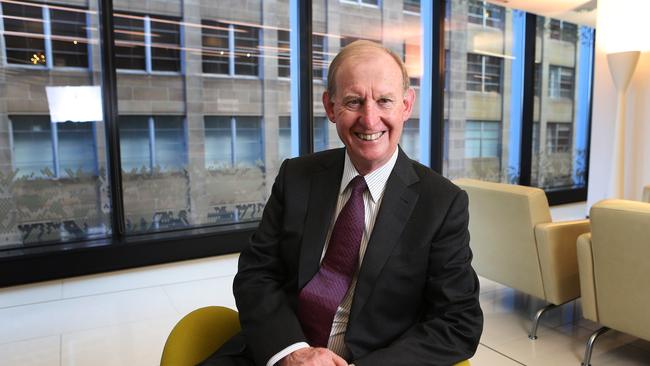David Murray says Labor’s Future Fund investment mandate changes increase risk profile
Former chairman David Murray believes Labor’s use of the $230bn sovereign wealth fund is risky and could affect its long-term returns.

Former Future Fund chairman David Murray believes any investment mandate changes to Australia’s sovereign wealth fund will increase its risk profile and potentially cut long-term returns.
Mr Murray, who was Future Fund Board of Guardians chairman from its inception in 2006 to 2012, said on Thursday that Jim Chalmers’ new investment mandate focusing on housing, energy transition and infrastructure was not aligned with the $230bn fund’s original purpose when it was set up by the Howard government.
He said that using the Future Fund as a government policy instrument was a threat to its independence and overturned its original investment mandate, which was to make commercial investment decisions free from any government influence.
“This policy that has been announced today isn’t free from government influence,” Mr Murray said. “It’s setting up specific purposes. The Future Fund originally never had specific purposes in its investments.
“For the Future Fund itself its means it’s directing its investments into particular classes which threaten the diversification of its risk and threatens its long-term returns.”
The Labor government on Thursday said it was elevating the Future Fund’s status as an enduring national asset and integrating it into the Australian economy.
It released its new investment mandate for the fund citing national priorities such as increasing the supply of residential housing; supporting the energy transition as part of the net-zero transformation of the economy; and delivering improved infrastructure.
The new investment mandate marked the first time a federal government had directed the fund towards specific asset classes since it banned tobacco investments in 2013.
Mr Murray, who was the chief executive of the Commonwealth Bank from 1992 to 2005, said changing the investment mandate would make the Future Fund vulnerable.
“If the government does off-budget financing then the outlays of various things are higher than otherwise evident from the budget,” he said.
“It also signifies that there are a lot more government outlays in the form of these off-budget investments in the system than was evident from the budget and means more pressure from demand in the economy and more pressure on inflation.”
Mr Murray said the investment mandate change had reinforced his earlier concerns about former Labor climate change minister and industry superannuation fund director Greg Combet replacing former federal Liberal treasurer Peter Costello as Future Fund chairman earlier this year.
Also, under the Future Fund legislation, the independent Future Fund Board of Guardians has the right to comment on the mandate and any disagreement with the government.
However, the federal Treasurer said they had given their agreement and support for the federal government’s changes after a year-long “constructive engagement”.
Mr Murray said there were risks inherent in the government mandate change, especially for an independent sovereign wealth fund.
“That’s why it was envisaged that the government would not specify forms of investment or in fact even a large range of exclusions from investment,” the former chairman said.




To join the conversation, please log in. Don't have an account? Register
Join the conversation, you are commenting as Logout